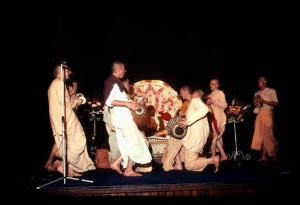SB 1.6.19 (1962)

A.C. Bhaktivedanta Swami Prabhupada
TEXT No. 19
Didikshustad aham bhuyah pranidhaya mano hridi Bikshomano api na apasyam avitripta iva aturah.
ENGLISH SYNONYMS
Didikshu—desiring to see, tad—that, Aham—I, Bhuyah—again, Pranidhya—having concentrated the mind, mano—mind, Hridi—upon the heart, Bikshomano—awaiting to see, Api—inspite of, Na- never, Apasyat—saw Him, Avitripta—without being satisfied, Iva—like, Aturah—agrieved.
TRANSLATION
I desired to see again that transcendental Form of the Lord but inspite of my attempting to concentrate the mind upon the heart with eagerness of reviewing the Form, I could not see any more and thus without being satisfied, I was like one very much agrieved.
PURPORT
There is no mechanical process to see the Form of the Lord. It completely depends on the causeless mercy of the Lord. We cannot demand the Lord to be present before our vision just like we cannot demand the sun to rise up whenever we like. The sun rises out of His own accord so also the Lord is pleased to be present out of His causeless mercy. One should simply await for the opportune moment and may go on discharging the prescribed duty in the matter of devotional service of the Lord. Narada Muni thought that the Lord could be seen again by the same mechanical process which was successful in the first attempt but inspite of his utmost endeavour he could not make the second attempt successful again. The Lord is completely independant of all obligations. He can simply be bound up by the tie of devotion unalloyed. Neither He is visible or perceivable by our material senses. When he pleases being satisfied with the sincere attempt of devotional service depending completely on the mercy of the Lord, then the Lord may be seen out of His own accord.